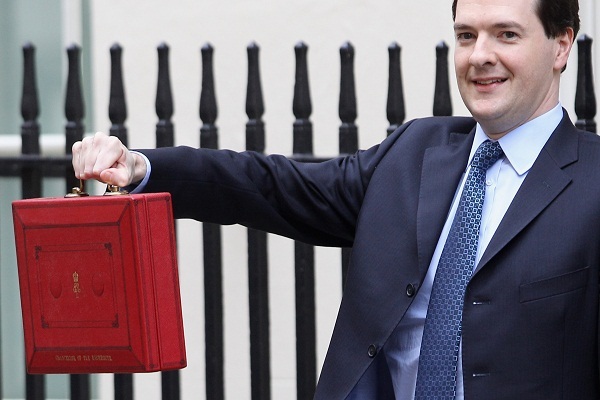There is now a general acceptance that the Tories’ 2015 election manifesto will contain a pledge, dare one say a cast-iron guarantee, that voters will be offered a referendum on Britain’s relationship with the EU. James first revealed this in his magazine column a few weeks ago. The aim is to see off the surge from UKIP, prevent Labour from opportunistically seeking Eurosceptic ground, and to counter Boris Johnson’s popular adoption of the People’s Pledge.
Since then it has been taken as read that George Osborne is responsible for this gambit, which is reasonable given that he is the Tories’ chief strategist, and a likely contender in a future leadership bid. Today, Paul Goodman, a former colleague of Osborne, has expanded on a point that he has been making for some time. He writes in today’s Financial Times that this is Osborne’s ‘greatest gamble yet’, because Europe is an issue with which the Tories have an unhappy past, and because Britain’s relationship with the continent is economically vital.
Speaking to people around Westminster and other interested professions, it seems that there are other risks too. The first is that the plan, in whatever form it finally emerges, supposes that the Tory leadership controls the ground, and that it can pick the time and place of any referendum. But, if the Eurozone crisis has taught us anything, it is that the British government, a peripheral player in the continental drama, struggles to shape events.
Some very plausible outcomes may force the Tories to push for a referendum earlier than 2015, which would, presumably, be impossible while in coalition with the Lib Dems. Some backbenchers have already indicated that a Greek exit from the euro should precipitate renegotiations and a referendum. (David Cameron has said that a referendum will be called only if new treaties change the balance of competences between London and Brussels.) If the currency union were to implode, then it follows that the EU would return to the negotiation table while its economies collapsed, which would increase calls for a referendum in Britain. Philip Hammond, an ally of the chancellor’s but one who apparently harbours ambitions of his own, has been making this point in Cabinet.
Hypotheticals give way to concrete stumbling blocks. The negotiations for the next EU budget round (2014-2020) are beginning to take shape. For the past three years, British officials have been at pains to urge fiscal restraint on their counterparts in Brussels; and the government did succeed in freezing the budget in line with inflation until 2020. But many conservative politicians are also determined that the government forces the EU to cut its expenditure. Andrea Leadsom MP of the Eurosceptic Fresh Start group is on record saying that 15 per cent of the £112 billion annual budget should be cut.
It was hoped in some Eurosceptic circles that movement could have made on this, because most major European governments were implementing domestic austerity measures. But the election of Francois Hollande in France and the recent fall of the Dutch government have changed the continental dynamic. Germany’s Foreign Minister, the Liberal Guido Westerwelle, wrote an article about the EU budget round last Saturday. He said:
‘The European Union’s budget should be consistently oriented toward growth: Anyone who wants new, flash-in-the-pan stimulus packages financed by yet more borrowing has learned nothing from the dramatic experiences of the crisis. The EU must utilize its resources better than before without spending more. Money is available for future-oriented tasks; in recent months, EU officials have been negotiating a 1 trillion-euro budget for 2014 to 2020. We should concentrate on using this huge sum consistently to promote growth and employment, innovation and competitiveness. At the same time, spending must be monitored more closely and linked to quantifiable criteria. Every euro spent from the EU budget must be shown to have been spent effectively.’
Westerwelle’s Teutonic discipline is seasoned with lashings of infrastructure spending:
‘Infrastructure projects must be promoted. The banking sector’s sluggish “blood supply” is also a problem for larger-scale infrastructure projects. Our roads, railways, and energy and telecommunication networks are among the European economy’s trump cards. They are important contributors to the European standard of living, which can be secured only in a Europe that continues to grow closer together. State-of-the-art infrastructure opens new prospects for growth by making private-sector investment more attractive. We need to mobilize private capital for the cross-border expansion of European infrastructure and look at innovative forms of public-private partnership.’
The one word you won’t find in his article is ‘cuts’. I’m told that we can expect the normal rows over the CAP and the British rebate to be exacerbated in the coming months.
2014 is also the year of the European elections. Given the budgetary setting, it is conceivable that UKIP’s call for a straight in-out referendum will be popular with exhausted voters. Therefore, the Conservatives’ cunning tactical ploy for 2015 will have been pre-empted by Farage’s gang in 2014.
Finally, a banking friend pointed out that the conceit at the heart of the Tories’ strategy will be transparent by 2015. ‘If they fight on Europe it will be because they can’t fight on the economy or the national finances,’ he said. He went on to explain that the proposed electoral strategy concedes that the economy will not have recovered and that, in all likelihood, the bond markets will have called George Osborne’s debt bluff. If that were to be the case, he wagered, then all the referenda in the world would count for very little. There are gambles and then there are gambles.






Comments